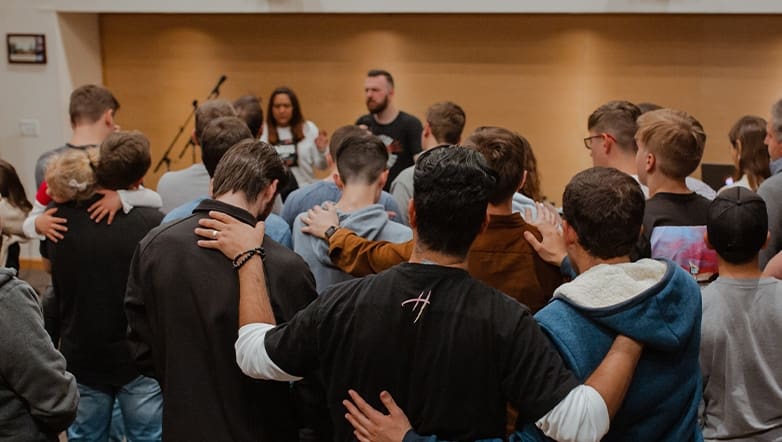Anxiety and addiction are often intertwined in ways that make recovery more complex—and more urgent. Many people turn to substances in an attempt to quiet the overwhelming fear, stress, or panic that anxiety brings. Unfortunately, those same substances often increase anxiety in the long run, creating a cycle that’s difficult to escape.
At Good Landing Recovery, we believe real healing comes from treating both the mind and the soul. Our Christ-centered approach supports individuals with tools for both emotional restoration and lasting sobriety.

The Connection Between Anxiety and Substance Use
Anxiety can feel relentless: rapid heart rate, racing thoughts, an inability to focus, or a deep sense that something is wrong. When that discomfort becomes chronic, many people reach for alcohol or drugs to self-soothe. It might begin innocently—a drink to take the edge off, a pill to sleep—but it rarely ends there.
When someone uses substances to avoid anxiety, it creates short-term relief. But that relief reinforces the idea that escape is the only option. Over time, this turns into dependence.
How Addiction Makes Anxiety Worse
What starts as a coping strategy quickly becomes a trap. Substance use alters brain chemistry, particularly the areas responsible for mood and stress regulation. As tolerance increases, anxiety tends to worsen—even when the person isn’t actively using.
This can lead to:
- Increased sensitivity to stress
- Mood swings or emotional numbness
- A sense of constant unease when sober
- Withdrawal symptoms that mirror or magnify anxiety
What once dulled the fear now becomes the source of it.
Navigating Anxiety in Early Recovery
Anxiety often intensifies during the early stages of sobriety. Without the numbing effects of substances, the nervous system is raw, overactive, and learning how to regulate again. This stage can be discouraging for those who expected immediate relief.
Common early recovery symptoms include:
- Restlessness and irritability
- Panic attacks or racing thoughts
- Sleep disturbances
- Feelings of dread or hopelessness
These experiences aren’t signs of failure. They’re signs of healing. At Good Landing Recovery, we walk alongside individuals during this delicate transition, helping them build healthier responses that don’t rely on self-medication.
How Anxiety Triggers Relapse
Even after a period of sobriety, anxiety can become one of the most significant threats to continued recovery. When stress builds, whether from work pressure, unresolved trauma, or family conflict, the urge to escape can resurface.
For many, anxiety becomes a trigger that tempts them to return to substances as a way of numbing or silencing inner turmoil. The sensations of anxiety, racing thoughts, shortness of breath, tightness in the chest, can feel unbearable. Without strong coping mechanisms, a person may view substances as the only relief. This is why recovery plans must include strategies for managing anxiety.
These strategies might include therapy, consistent routines, daily prayer or meditation, physical activity, or support groups. Avoiding relapse means preparing for anxiety before it hits, building a solid foundation so that when the storm comes, the person has something to stand on.

A Faith-Based Framework for Peace
God’s Word offers reassurance in the face of fear. Philippians 4:6–7 encourages us, “Do not be anxious about anything, but in everything by prayer and supplication with thanksgiving let your requests be made known to God.”
Faith offers:
- A grounding truth when emotions feel chaotic
- A reminder of identity beyond addiction or fear
- Strength and courage to face discomfort with hope
We integrate Scripture, worship, and prayer into the healing journey to anchor recovery in something deeper than personal willpower.
Why Whole-Person Recovery Works
Addiction isn’t just a physical problem, and anxiety isn’t just a mental one. Both touch every part of a person’s life, which is why a fragmented approach to treatment rarely succeeds. Whole-person recovery addresses the physical body, the emotional experience, the relational network, and—most critically—the spiritual life.
At Good Landing Recovery, this looks like a blend of clinical therapy for anxiety and addiction, biblical counseling that speaks to the soul, group sessions that restore connection, and lifestyle practices that support the body. We believe healing is only complete when the spirit is restored alongside the mind and body. It’s not just about stopping the behavior—it’s about finding peace, identity, and strength through Christ to build a new way of life.
Tools for Managing Anxiety Without Substances
While spiritual growth is the foundation, practical strategies also play a role in recovery. We equip clients with tools to manage anxiety in healthy, sustainable ways:
- Cognitive Behavioral Therapy (CBT): Teaches how to reframe negative thought patterns
- Breathwork and grounding exercises: Help regulate the nervous system in moments of panic
- Physical care: Nutrition, hydration, and exercise all reduce baseline anxiety
- Sleep hygiene: Rebuilding a healthy sleep schedule supports mental clarity
These habits take time, but they become part of a new rhythm—one built around peace instead of panic.

Supporting a Loved One Facing Both
It’s hard to watch someone struggle with addiction and anxiety at the same time. Often, well-meaning family members try to fix one problem without realizing how connected the two are. The most helpful thing you can do is offer steady support—without judgment—and encourage integrated, professional care.
What can you do?
- Listen without rushing to solve: Let them speak openly without pressure.
- Encourage treatment that addresses both: Faith-based rehab that incorporates clinical mental health support is essential.
- Pray with them: Spiritual encouragement reminds them they’re not alone.
Your presence can be a lifeline.
Breaking the Cycle for Good
Anxiety and addiction are deeply connected, but they don’t have to define your future. Healing happens when both are addressed with care, compassion, and Christ-centered truth. At Good Landing Recovery, we support individuals as they rebuild their lives—emotionally, spiritually, and physically.
If you or someone you love feels stuck in the loop between anxiety and addiction, there’s a way out. And there’s a community ready to walk that path with you.

